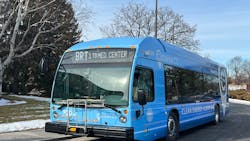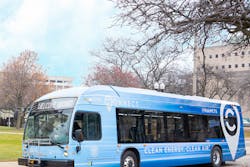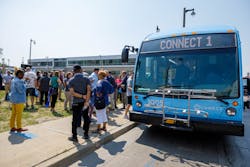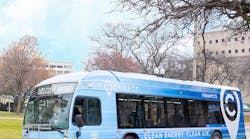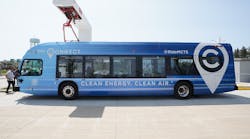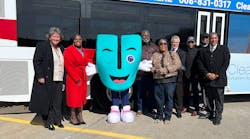MCTS’ CONNECT 1 BRT Bringing Public Transportation Usage Up in Milwaukee Area
Bus rapid transit (BRT) systems are becoming the modern way to travel using public transit. In Milwaukee, Wis., the Milwaukee County Transit System (MCTS) launched the CONNECT 1 BRT system in June. The BRT travels alongside a nine-mile route, providing service from downtown Milwaukee to the city of Wauwatosa. The BRT features 33 bus platforms on its route.
The process of designing and constructing the BRT project took almost seven years. When the concept was first brought up in 2016, Milwaukee County supervisors wanted to see a modern transit system that used electric buses to transport Milwaukee residents from point A to point B.
Anna Schryver, marketing and communications manager for MCTS, notes a BRT system is significantly less expensive than a rail line, something the Milwaukee County supervisors took under consideration when planning the eventual CONNECT 1 line.
“During the planning phrase of the project, the thought was that the BRT could bring all the benefits of light rail, including frequency and an established route. It could bring everything that cities and counties look at in a light-rail service without the cost associated with a light-rail service,” Schryver said.
The timeline
In 2016, Milwaukee County Supervisors conducted a feasibility study on the proposed new BRT line. During the years of 2017 and 2018, MCTS worked with the Federal Transit Administration (FTA) on the development of the project and conducted an engineering/environmental review. MCTS would continue to tinker with the final design until 2020 when it received a Capital Investment Grant of $40.9 million from the FTA for the project.
MCTS selected HNTB, who had been working with MCTS since the beginning of the project, to be the construction manager for the BRT following a request for proposals. Construction on CONNECT 1 started in mid-June 2021 in the middle of the COVID-19 pandemic. The project was supposed to launch in October 2022 but was pushed back multiple times due to supply chain issues related to the pandemic. HNTB Project Manager Mike Zabel noted there were a range of items that were delayed, which were critical to completing construction, including electrical components and batteries for battery electric buses (BEB).
Battery electric buses
Part of the delays on the project had to do with the lack of BEBS MCTS had received. As Mass Transit previously reported, the supply chain challenges impacting the transit industry’s manufacturing base, including bus manufacturers, a combination of inflationary pressures and pricing volatility.
MCTS selected Nova Bus to provide 15 LFSE+ buses for the project in March 2021. The first 11 of the vehicles were set to arrive in November 2022 to run exclusively on the CONNECT 1 BRT while four additional vehicles were set to join MCTS regular routes. As of August 2023, MCTS has only received nine of the 15 vehicles due to supply chain issues related to the pandemic. The agency is hoping the rest of its order arrives by the end of 2023 or early 2024.
“A big part of the delay of the BRT line had to do with the electric buses,” said Dwyane Reese, director of maintenance at MCTS. Every bus company in the United States has dealt with the same supply chain issues due to COVID, so we’re not blaming Nova. It’s just reality.”
Further complicating the CONNECT 1 project is the recent news that MCTS pulled all of the Nova Bus LFSE+ BEB’s off the project in late August due to a manufacturing recall. Nova Bus sent MCTS the notice of the recall via letter. While MCTS said Nova Bus had tested the buses and they’re safe to drive, MCTS made the decision to only run clean diesel buses until the batteries on the BEBs have been replaced. The batteries will be replaced at no charge to MCTS.
Schriver says MCTS does not anticipate any changes to its relationship with Nova Bus or its plans to add more BEB vehicles due to the recall of the LSFE+ buses.
“Nova is committed to selling us parts throughout the 12 years of our warranty, so we don’t expect any changes,” Schriver noted.
MCTS is not yet transitioning to a full zero-emission fleet, but that is the goal someday. For now, it is using a combination of BEBs and clean diesel buses. CONNECT 1 currently features seven BEBs and five clean diesel buses.
Charging station
As part of electric buses coming to the CONNECT 1 Line, MCTS implemented a charge management plan. The fleet is charged overnight and an ABB-manufactured charging station for topping off a vehicle’s charge was constructed by HNTB along the BRT route in Wauwatosa at the Park & Ride lot.
Every third lap, the buses go to the charging station during a route’s six-minute layover. Reese notes the buses receive a 30 percent charge at the layover before proceeding to their next destination.
Ridership feedback
Despite only being open for a few months, MCTS officials are seeing an increase in public transit usage with the BRT. In the first week of CONNECT 1 service, the BRT line delivered approximately 16,800 rides from June 4 through June 10.
The BRT line features service every 10 minutes on weekdays during peak times and midday and every 15-30 minutes during off-peak hours. On the weekends, CONNECT 1 runs every 15 minutes during peak hours and 20-30 minutes during off-peak hours.
The top destinations for the CONNECT 1 include:
- Downtown Milwaukee – serves approximately 700 rides per day.
- Marquette University – serves approximately 500 rides per day.
- Milwaukee Regional Medical Center – serves approximately 200 rides per day.
- Water Street (the most popular station) – serves approximately 300 rides a day.
- Metro 1 ridership has increased from approximately 300 rides per day to 700.
- Approximately 20 people who use mobility devices ride CONNECT 1 per day.
“The feedback we're getting is overwhelmingly very positive,” Schryver noted. Riders are enjoying the silent ride on the electric buses, as well as the reliability. At every station, there's a real-time sign that tells riders when the next bus is coming and that's been a welcomed feature.”
MCTS was planning on implementing the MCTS WisGo fare-capping system for customers Sept. 30 but a supply chain delay will keep the CONNECT 1 BRT fare-free until early 2024.
“We've seen entire families give the BRT a try. We have a huge festival schedule, and people really are enjoying riding it to the lakefront festivals that Milwaukee is known for, and what we're seeing is people are building a new route into their everyday life as part of what they're doing in the community,” Schryver said.
“Having the opportunity to partner with Milwaukee County on the first BRT route in the state of Wisconsin and help deliver a route that supports economic development, greater access to jobs and advances the region’s overall transportation network was special,” Zabel said. ‘It has been a great experience being involved in this project from the very beginning and helping the vision become reality.”
Another BRT?
The CONNECT 1 BRT is not the only BRT project MCTS is planning. Milwaukee County is currently in the process of planning its north-south BRT line, which is scheduled to open in 2028. Construction for the north-south BRT line is also being done by HNTB.
Within the next decade, MCTS is hopeful many of its residents will use one of the two BRT lines for their everyday commutes and personal needs.
“The CONNECT 1 BRT is the future of public transit and the future of MCTS and we can’t wait to expand our BRT footprint with the north-south BRT we are planning to launch in 2028,” Schryver commented.

Brandon Lewis | Associate Editor
Brandon Lewis is a recent graduate of Kent State University with a bachelor’s degree in journalism. Lewis is a former freelance editorial assistant at Vehicle Service Pros in Endeavor Business Media’s Vehicle Repair Group. Lewis brings his knowledge of web managing, copyediting and SEO practices to Mass Transit Magazine as an associate editor. He is also a co-host of the Infrastructure Technology Podcast.
